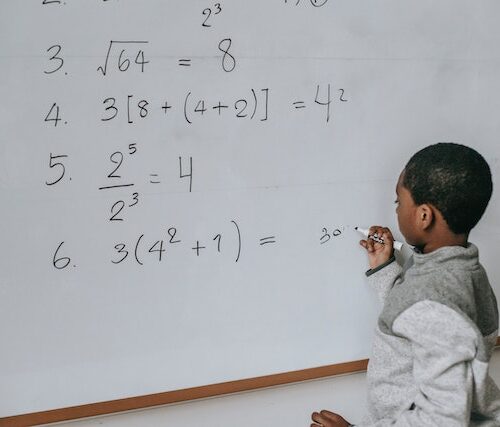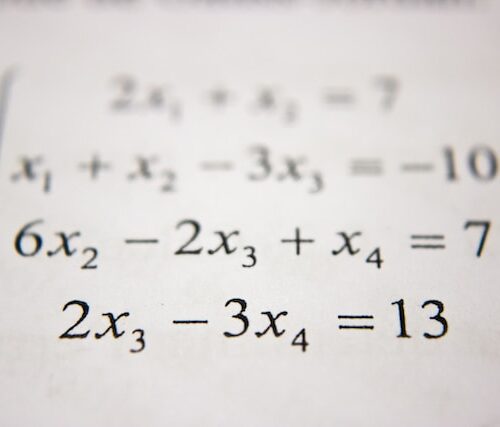When we think of math, we often think of boring textbooks, frustrating homework assignments, and long hours spent struggling over equations. However, math can be so much more than that!
Making Math Fun: Tips and Tricks for Teens
With the right approach, math can become a fascinating subject that challenges and excites teenagers. In this blog post, we will explore some tips and tricks for making math fun for teens, so that they can feel inspired to learn and grow.
Connect Math to the Real World
One of the best ways to make math more engaging for teenagers is to connect it to the real world. Often, math can seem abstract and disconnected from everyday life, which can make it feel unimportant or boring. However, by showing teens how math applies to their lives, you can help them see its relevance and value. For example, you might explore how math concepts like probability, statistics, and geometry apply to sports, music, cooking, or art. By connecting math to the things teens already love, you can help them develop a deeper appreciation for the subject.
Use Games and Puzzles
Another tip for making math more fun is to use games and puzzles. Teens love a good challenge, and math-based games and puzzles can provide just that. There are many resources available online that offer math-based games and puzzles, such as Sudoku, Kakuro, and math crossword puzzles. You can also create your own games and puzzles using math concepts, such as using graphs and charts to track progress or using dice and cards to play math-related games. By making math into a game, you can encourage teens to develop their problem-solving skills and have fun at the same time. For more ideas and resources on math courses, check out this Website.
Encourage Collaboration
Teens are often more motivated when they’re working with their peers, so encouraging collaboration can be a great way to make math more enjoyable. Group projects, study groups, and peer tutoring are all great ways to encourage teens to work together and support each other in their math studies. When teens work together, they can share ideas and perspectives, help each other with difficult concepts, and develop their communication skills. This can make math feel less stressful and intimidating, and more fun and social.
Celebrate Progress and Achievements
Finally, it’s important to celebrate progress and achievements when it comes to math. Math can be a challenging subject, and it’s easy to feel discouraged when progress is slow or when mistakes are made. However, by recognizing and celebrating even small achievements, you can help teens feel more positive and motivated about their math studies. This might involve praising effort, celebrating milestones, or offering rewards for hard work. By celebrating progress and achievements, you can show teens that their efforts are valued and help them build confidence in their math abilities.
Math doesn’t have to be a dull or frustrating subject for teens. By connecting math to the real world, using games and puzzles, encouraging collaboration, and celebrating progress and achievements, you can help teens find joy and excitement in this important subject. With the right approach, math can become a fascinating and rewarding subject that challenges and inspires teenagers to grow and learn. So, whether you’re a teacher, parent, or student, use these tips and tricks to make math more fun and engaging for teens today!

Math Games for Teens to Improve Their Skills
Mathematics can be a challenging subject for many teenagers, and it’s often a subject that requires a lot of practice and repetition to master. However, studying math doesn’t have to be a dull and repetitive exercise. With the help of some engaging and interactive math games, teens can improve their math skills without feeling bored and overwhelmed. In this blog post, we’ll explore some of the best math games for teenagers that can make learning math more fun and enjoyable.
The Number Game
The Number Game is a fun and challenging game that tests teens’ ability to solve math equations quickly. The game has different levels that increase in difficulty as the player advances, and it covers a wide range of math concepts like addition, subtraction, multiplication, and division. The game is free to play and can be accessed online, making it easy for teens to practice their math skills at any time.
Brain Quest Math
Brain Quest Math is a popular game that helps teens practice and review their math skills. The game covers various math subjects like geometry, algebra, and statistics, and it also includes challenging problems that require critical thinking and problem-solving skills. The game is designed for middle and high school students and is available in both physical and digital versions.
Math Blaster
Math Blaster is an exciting and engaging game that helps teens build their math skills through fun and interactive gameplay. The game allows players to create their virtual characters that explore a virtual universe and solve math problems along the way. The game includes various math challenges like fractions, decimals, and algebra, and it’s suitable for teenagers of all skill levels.
Prodigy
Prodigy is an online math game that combines fun, adventure, and learning into one exciting package. The game is designed for kids and teenagers in grades 1-8 and includes over 1200 math skills that cover essential math concepts like addition, subtraction, multiplication, and division. Prodigy allows players to explore the virtual world, battle monsters, and learn math at the same time.
Math Playground
Math Playground is an online math game that offers a wide range of math activities, games, and puzzles that help teenagers improve their math skills. The website includes various math topics like geometry, fractions, and algebra and provides clear explanations and instructions on how to solve each problem. The website is free to use and can be accessed from any device with an internet connection.
Math can be a challenging subject for many teenagers, but with the right tools and resources, it can become a fun and enjoyable subject to learn. Math games are an excellent way to help teenagers improve their math skills while having fun at the same time. Whether it’s online games or board games, there are countless options available to help teens practice their math skills and become successful in math. So why not try out some of these math games and see how fun learning math can be?








